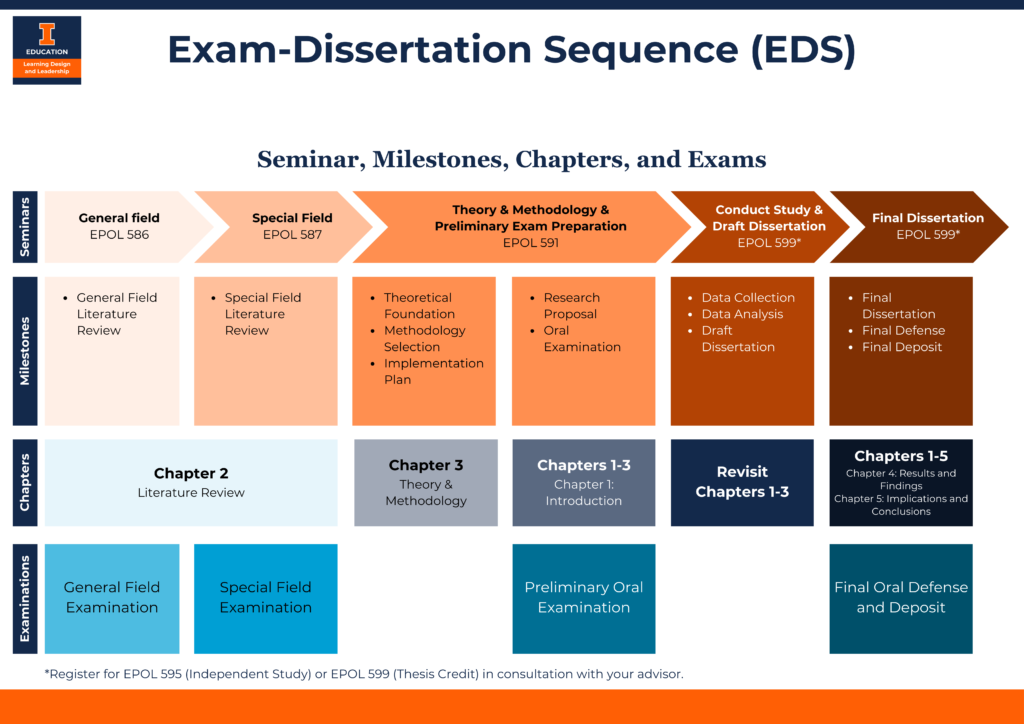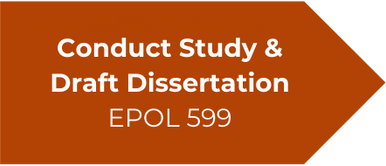The Exam-Dissertation Sequence (EDS) involves a series of seminars and incremental and cumulative milestones to help you complete your examinations and build towards your final dissertation.
View a visual of the Exam-Dissertation Sequence
Refer to the EDS Overview page for specific information.


Seminar Summary and Key Links
0. EDS Prework
During your last semester of coursework, complete the EDS Prework. Do not wait until you are finished with your coursework.
Expected Duration: Two to three hours

Learn about the EDS process & requirements
1 and 2. General and Special Field Qualifying Exams
The General and Special fields originally are two separate literature reviews and examinations, but they will eventually become a streamlined Chapter 2 for your dissertation.
Expected Duration: These steps together can take six to nine months, with the General Field usually taking longer than the Special Field.

Complete action items and deliverables that prepare you for your General Field qualifying exam.

Complete action items and deliverables that prepare you for your Special Field qualifying exam.
3. Theory and Methodology and Preliminary Exam (595 and 591)
The Preliminary Exam seminar prepares you to write Chapter 3 of your dissertation and then Chapter 1. Chapter 3 includes your theory and methodology, broken into three parts and projects so that you can receive incremental feedback. You will then draft Chapter 1 and prepare your full research proposal (Chapters 1-3) and oral examination.
Expected Duration: These steps together can take six to twelve months to complete, with the Methodology chapter taking longer than the Preliminary Exam. You preliminary exam manuscript must be approved six weeks prior to scheduling the oral examination.

Chapter 2 addresses what the literature says about theories associated with your topic, while Chapter 3 Part 1 is about how your selected theory applies to your research study (Part 1). Create a draft of your logic model.

Chapter 3 Part 2:
Deeply examine existing literature associated with your chosen methodology and its alignment with your study

Chapter 3 Part 3:
Design the implementation plan. This also includes your IRB documentation. Update your logic model.

Streamline your Chapter 2. You will submit your completed Chapters 1 to 3 and present your research proposal to your peers and then your committee during an oral exam. During your oral exam you may be asked to make revisions prior to starting your data collection
Through each of these iterations you will craft a logic model that provides a visual representation of your study, linking the theoretical foundation to the methodology and data collection and analysis strategy.
4. Data Collection and Analysis
Once you pass your preliminary exam and take on board any committee feedback, you may begin collecting data. There are also several tasks you can be working on while your waiting for all of your data to come in, including conducting a preliminary analysis of your interim data. Once all data is collected, you can begin your comprehensive data analysis.
Expected Duration: These steps will depend on the duration of your research study and the type of methodology and analysis required, as outlined in your implementation plan.

Execute your research study according to your implementation plan. Plan to evaluate your data and be prepared to make adjustments based on the response rate.

Follow these tips to make the final dissertation process a little simpler.

Analyze your data along the way and according to your implementation plan. Make any adjustments to your methodology and/or analysis procedures to ensure that the findings are presented in a credible and useful way.

Chapter 4 is about your execution, results, and findings. Chapter 5 is about your contributions and conclusions..
5. Dissertation Draft (599)
Drafting and finalizing your dissertation is an iterative and ongoing process. You should expect multiple rounds of feedback and revision prior to being approved to schedule your final defense.
Expected Duration: The drafting and revision process can take at least six months. Your final manuscript must be approved by the start of the term preceding your desired defense semester.
6. Final Dissertation, Defense, and Deposit (599)
You made it! At this stage, your committee reviews your full manuscript, you defend your dissertation in an oral presentation, make any requested revisions, and then complete the deposit review process.
Expected Duration: This can typically be completed during a single semester. The Graduate College has specific deadlines in order to graduate during a specific semester. The defense is typically due about a month before the end of the semester and the final deposit is due about 2 weeks before the end of the semester.

Once approved by your advisor, you will present your final exam to your peers and then to your committee.
- Final Exam Manuscript: Chapters 1 to 5, References, and Appendix

After committee and departmental review, make any necessary revisions.

Once your revisions are approved by your advisor and committee, route for department review

Once approved by the department, follow the Graduate College guidelines to deposit your approved dissertation.
See also: Policy on Re-using Work (restricted access)